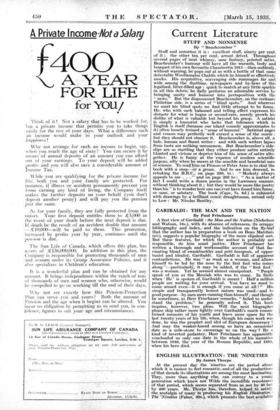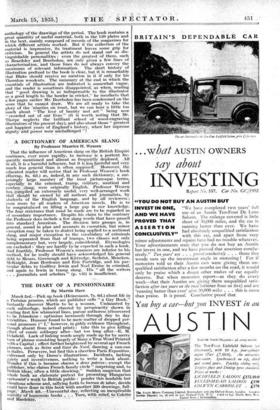ENGLISH ILLUSTRATION: THE 'NINETIES By James Thorpe At the present
day the 'nineties are the period about which it is easiest to feel romantic, and of all the productions of that decade its illustrations are among the most fascinating. They, more than anything else, can convey to a Young generation which knew not Wilde the incredible remoteness of that period, which seems separated from us not by 40 but by 400 years. Mr. Thorpe has, therefore, helped to satisfy the nostalgia of many in producing his English Illustration The 'Nineties (Faber, 30s.), which presents the best available anthology of the drawings of the period. The book eontains a great quantity of useful .material, both in the• 120 plates and in the text, mainly composed of records of the magazines for which different artists worked. But if the collection of the material is impressive, its treatment leaves some grip for criticism. In general the artists do ncit stand out as dis- tinguishable personalities : even the greatest of them, such as Beardsley and Beerbohm, are Only given a few lines of characterization, and these lines do not always 'convey the maximuin of relevant irifOrmatiori. ' The shoit history Of illustration prefixed to'the book is clear, but if iii remarkable that Blake should receive no mention in it if only for his . Thornton woodcuts. , The summary at the end in which the essentials of illustration are indicated is somewhat vague, and the reader is sometimes disappointed; as when reading that "good drawing is as indispensable te the illustrator as a geed length to the bowler in cricket," he recollects that a few pages earlier Mr: Beerbohm has been condemned en the store that he cannot draW. , We are all ready to take • the glory of the 'ninetiOs On-truSt; but we can hear a little too much about " The ' hive of beafity 'and art" being now " crowded out of our Hires " (it is 'worth noting that Mi. Thorpe neglects the " brilliant school of wood-engraving llustrators" of the present day); and also about those " greatest and happiest' years of England's history, when her ibpreme dignity and power were unehalleriged "1











































 Previous page
Previous page